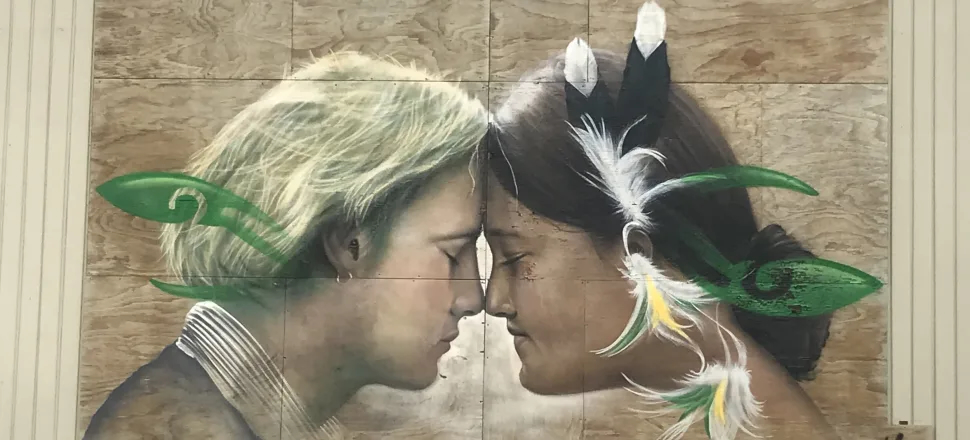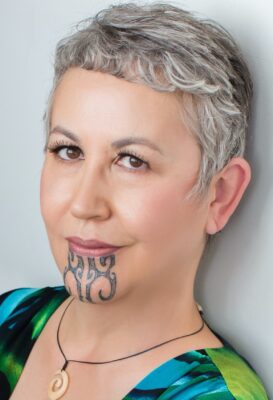Mural at Western Springs College/Ngā Puna o Waiōrea, Tāmaki Makaurau/Auckland
In Aotearoa New Zealand, the concept of co-governance has been used mainly in discussions about national conservation lands. That these discussions have been widespread for some time is indicated by a 2016 report from the Office of the Auditor-General on principles for effectively co-governing natural resources. The report notes that successful co-governance relies on effective relationships, which take time and commitment from all parties to build and maintain. There is a distinction to be made between co-governance, which is concerned with strategic matters, and co-management, which covers day-to-day operations, but the two can and do overlap in specific contexts, such as in the case studies canvassed in the report, which vary widely in size and specificity, from the Tūpuna Maunga o Tāmaki Makaurau Authority (Auckland) to the Maungatautari Ecological Island Trust (Waikato).
Referring to co-governance as an ‘evolving space,’ the report notes that policies and approaches vary and that formal agreements are often reached as a result of long negotiations, including Treaty of Waitangi settlements. The principles listed for effective co-governance and co-management arrangements are, as might be expected, commonsensical in nature, including a shared understanding of purpose and how people will work together; involving people with appropriate experience and capacity; accountability and transparency; and an adaptable plan for financial accountability.
Since 2016, and as the country prepares for a national election in October 2023, there have been rapid changes in the climate of social commentary on topics related to Māori rights. The word ‘co-governance’ joins other terms concerning inter-ethnic relations in Aotearoa New Zealand, which many people find difficult to understand or apply in their daily lives. These include biculturalism, cultural responsiveness, Te Tiriti o Waitangi and partnership.
Co-governance, as a concept of shared resource management between Māori and the Crown, has played a similar role in the field of conservation policy as that of biculturalism in state schooling. In English medium schools, the aim of biculturalism was translated into the policy driver of cultural responsiveness, which effectively equates to respecting the cultures of our students, but without mentioning concepts such as racism or colonisation that might upset Pākehā feelings. But respecting our students’ cultures is considered normal in good teaching practice anyway, so it does not seem to justify being labelled as anything more. This insight suggests that culturally responsive pedagogy (CRP) is oriented more towards enabling non-Māori teachers to tick the box of cultural competence than towards concern with making real changes for Māori students at nationally significant levels. The point is that overcoming historical ethnic inequity in education is far more difficult than typical educational discourse admits, including the CRP discourse. Changing the hearts and minds of teachers, one at a time, is important but cannot be confused with structural and societal level change.
Formal Crown-Māori relationships originate in Te Tiriti o Waitangi, which is another opaque term for most of the non-Māori national population. For decades, it has been unpacked in terms of its ‘principles,’ including partnership. From a Māori perspective, the problem with the ‘partnership’ discourse is that Pākehā usually assume that partnership can begin from current conditions, when Māori have long been stripped of almost all of their assets and economic bases and largely relegated to the proletariat class; once the honest, blue-collar worker, now the economic precariat and growing underclass of New Zealand society.
In this context, the country’s longstanding national reputation for the ‘best race relations in the world’ stands tattered but still retains purchase, especially when considered in relation to the worsening conditions for social liberalism and positive inter-ethnic relations on an international scale. It is instructive to consider the career of the talented Mr Julian Batchelor, who in 2023 has undertaken an extraordinary ‘anti-co-governance’ national tour.
Batchelor is a disaffected Pākehā man with a background as a schoolteacher. He studied education at Massey University, Palmerston North, where he also experienced a religious conversion, completing a degree in theology. According to online records, Batchelor, at some point, held a position as a school principal but left education to become a Christian evangelist, an investigative journalist and a real estate agent. In 2008, he purchased Oke Bay Lodge, a property at Oke Bay in Te Tai Tokerau, the Far North, and a site of cultural significance to the iwi of Rāwhiti Marae. Batchelor planned to re-develop the existing buildings to establish a Christian retreat, using his successful real estate career to fund the project.
From late 2015, Batchelor became embroiled in a bitter and drawn-out dispute with local iwi and the Far North District Council (FNDC) over his illegal groundworks and retaining walls that exceeded what he had been permitted to build and impinged on wāhi tapu (sacred sites). It seems Batchelor became convinced that the iwi was trying to take his property off him. He seems to have been completely ignorant of local land histories and politics, with no idea of the significance of his land in Māori terms. He states that the dispute triggered his involvement with anti-co-governance. In this sense, Batchelor is a classic example of White Fragility. A different approach that was open to working with (rather than against) the tangata whenua (local iwi) could have had polar opposite outcomes for all concerned.
In this sense, the origins of what inspired Batchelor to undertake his anti-co-governance tour must be seen as his choice, based on his blinkers, his weaknesses and his gullibility. It is difficult to believe that he shelled out of his back pocket for the costs of the tour – that is simply not a credible scenario, when one considers his biographical details. We must then ask who financed Julian Batchelor to undertake his extensive anti-co-governance national tour of 2023. Who has an interest in causing that kind of damage to Aotearoa New Zealand society and inter-ethnic relations?




